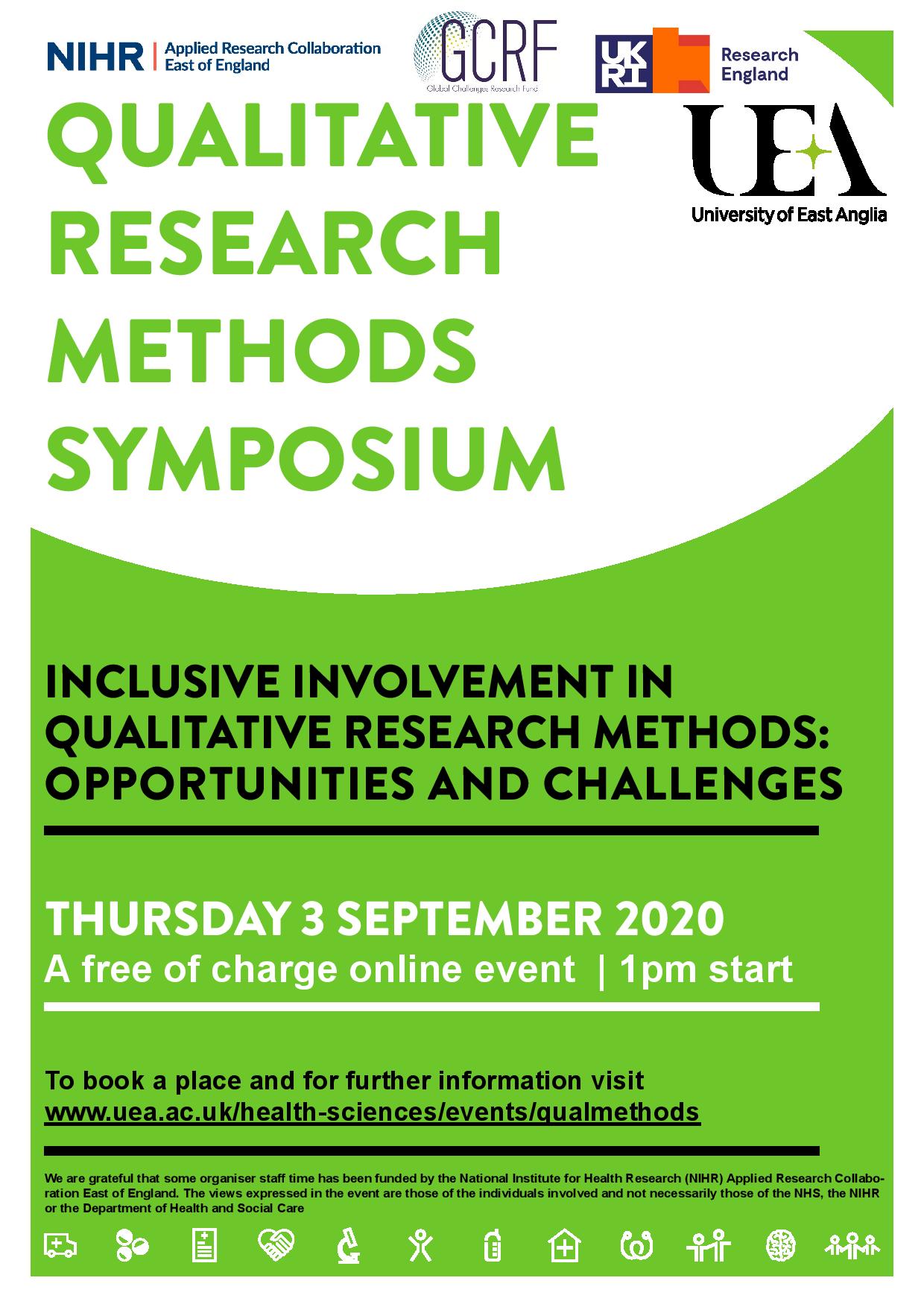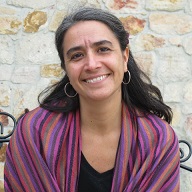This web page will be updated regularly with event information. For general enquiries please email contact.qrms@uea.ac.uk

Inclusive Involvement in Qualitative Research methods:
Opportunities and Challenges
3 September 2020, 1pm start
The symposium will take place online. The keynote speakers, topics and presenters for the interactive presentations and workshops remain the same.
Addressing inclusion can be powerfully transformative in building and connecting new knowledge, relations and experiences between individuals, groups and societies.
This symposium focuses on inclusively involving in and through qualitative research methods.
Inclusive research confirms the value of researching ‘with’ and not ‘on’ people’s lives so that how it works and what it produces can be mutually-agreed, to break down divisions between research participants and makers. This recognises that all of us may be doing research in our everyday lives. It can help us recognise and redress power imbalances linked for instance to class, race and disability, increasingly relevant in working across boundaries.
Building inclusive research is therefore co-constructed through negotiation between different kinds of users, and is now more widely required in research practices and international networks. This goes beyond “implementing” to also make research collaboration (or lack of it) transparent to everyone involved. Qualitative research has an important part to play here in going beyond administering standardised measures to a population to actively, responsibly and negotiate the research boundaries and research roles as we go along. Rather than asking questions and getting answers, we negotiate both questions and ways of answering those questions. In turn, we aim to facilitate collective learning rather than to centralise the dissemination of learning by researchers in “developed” countries. This means that “doing research inclusively is gradually transforming through collective practical wisdom and praxis” (Nind 2017).
Drawing on interdisciplinary and international discussions and insights, this year’s symposium will explore the dimensions and implications of this practical wisdom in bringing together the insights and experiences of the speakers and all those taking part.
M. Nind (2017) The practical wisdom of inclusive research, Qualitative Research, 17 (3): 278-288
Introduction to the symposium
In this introductory session, Professor Fiona Poland and Dr James Cornford called for your ideas on developing a manifesto on how qualitative research can support inclusive involvement. Watch the recording here
The Inclusion Manifesto was crowdsourced from contributions by participants in the Qualitative Research Methods Symposium, organised by the University of East Anglia's (UEA) Qualitative Research Forum, held online on September 3rd, 2020.
Keynote Speakers
Is inclusion a delusion, illusion or achievable? Participative Action Research in higher education organisations, how we can make it happen?
Dr Geraldine Lee Treweek's (Birmingham City University) research explores community development and social inclusion
Pre-symposium welcome and discussion taster

Helping to re-build, re-connect and re-vitalise: Qualitative researching for knowledge that matters to indigenous peoples in a time of environmental and climate emergency
Iokiñe Rodriguez-Fernandez (UEA) uses participatory action-research to address local environmental knowledge and conflict transformation in Latin America

Discussion Sessions
Working together: ways of exploring whole-home approaches to support older residents to ‘drink well’
Diane Bunn, Lecturer in Health Sciences, University of East Anglia
We will discuss the issues around co-productive working in a qualitative study exploring ways of supporting care home residents to ‘drink well’ for both their health and enjoyment. Drinking is an everyday activity which becomes increasingly complex for people who are dependent on others, as care home residents are. Some residents may only need staff to provide drinks regularly, whilst others may need more active staff help and assistance, any may rely on care home staff to provide levels of care and support appropriate to their needs and wishes. In this workshop we will explore ways in which researchers, care home staff and residents worked together to develop and appreciate new ways of supporting residents to ‘drink well’, to share the practicalities and importance of collaborative working to rebalance ‘dependent’ relationships. Watch the recording here

The Inclusion Paradox: Participation and the Challenge of Exclusion
Jason Chilvers, Professor of Environment & Society, University of East Anglia
In this interactive discussion session, I will start by putting forward an alternative constructivist and science and technology studies (STS) perspective on ‘participation'. This suggests that rather than being inclusive - as commonly assumed and claimed - all forms of participation are by definition exclusive and exclusionary. This is because all attempts at inclusion construct the participants, objects and practices of participation in particular ways, to the exclusion of other ways. Inclusions are thus always partial.
When we try to include participants in questions to do with our research other diverse inclusions, publics and public issues will always exist around these very same problems. On the basis of this I will pose the following question for discussion: how can we attend to these problems of exclusion and multiplicity when attempting to involve citizens in deliberating sustainable energy futures in the UK? I will then show how we have gone about addressing this challenge through developing new approaches to mapping participation in projects undertaken within the UK Energy Research Centre (UKERC) and the Science, Society and Sustainability (3S) Research Group at UEA. Watch the recording here

Parallel Workshop and Poster Presentations
Room 1: Poster (walk)
Room 2: Workshop 1
Negotiating the Ladder of Participation in Designing Qualitative Research
Laura Biggart, Associate Professor in Social Science Research, University of East Anglia
In this this workshop, we will draw on a research case study for which a participatory approach is used to include a diverse set of stakeholders.
We will refer to Arnstien’s (1969) Ladder of participation and Hart’s (1992) adapted participation model for children to propose a participatory research design for the case study. We will consider options available to put these into practice.
Room 3: Workshop 2

Digital Storytelling as a Qualitative Method of Inquiry to Promote Inclusivity: Examples from Researching Domestic Abuse and Covid19
Eylem Atakav, Professor of Film, Gender & Public Engagement, University of East Anglia
As the brilliantly inspirational Michelle Obama reminds us: “Your story is what you have, what you will always have. It is something to own… When we share our stories, we are reminded of the humanity in each other. When we take the time to understand each other’s stories, we become more forgiving, more empathetic, and more inclusive." We are all storytellers. In this workshop, attendees will be encouraged to think about and gain insights into how they can use digital storytelling as a qualitative method of inquiry to promote inclusivity in the context of their own disciplines.

Poster Abstracts
-
Agile Performance Management for Agile Organisations - Kara Langford, Norwich Business School, UEA
-
Qualitative research drives participant involvement in the exploration of the new role of Physician Associates in secondary care - Stephanie Howard Wilsher, Norwich Medical School, UEA
-
Challenge of Inclusive Methods Under Covid-19 Pandemic - Chisaki Fukushima, Centre for Rural Economy, School of Natural Environmental Sciences, Newcastle University
-
Co-designing a health promotion programme with vulnerable women
By Kathleen Lane (School of Health Sciences, UEA), Andy Jones (School of Environmental Sciences, UEA), Wendy Hardeman (School of Health Sciences, UEA), Charlotte Salter (Norwich Medical School, UEA) and Sarah Hanson (School of Health Sciences, UEA). -
Modelling Partnerships for Change in Care Placements - Emma Mclorie, Paul Brocklehurst, Lynne Williams, Sion Williams, School of Health Sciences, Bangor University
Symposium finale

:focus(1831x1009:1832x1010))